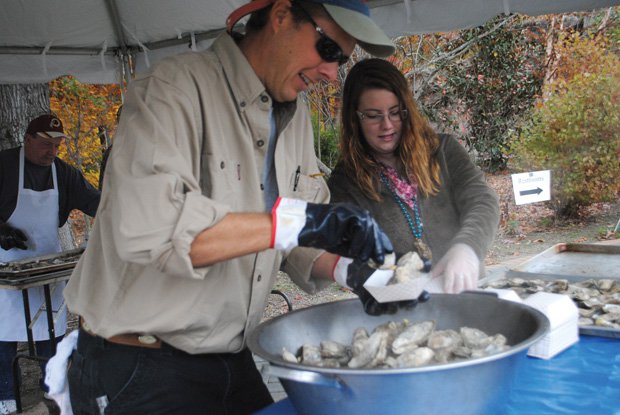A new Montpelier statue and a daily drive on Georgetown Pike conjure images of a graceful and courageous first lady.

James and Dolley Madison Sculpture

Maybe because May 20 was her birthday, or because, a week later, Montpelier dedicated a new, life-size sculpture of James and Dolley Madison, but America’s fourth first lady has been on my mind lately.
Actually, I feel as though I know her. I’m sure I’d recognize her if she came into the room, a woman of 5 feet 6 or so, with dark hair and an air of both warmth and elegance. Maybe a rose is tucked at the edge of one of her famous turbans, and she most likely has a book in her hand, “for conversation.” Perhaps we’d have tea, sitting together on her yellow silk sofa in the Mansion. “With all respect, dear Mrs. Madison,” I’d begin, and I’d ask all kinds of questions.
I would ask how she’d had the courage, in her mid-20s, to survive the death of her young husband and baby son and go on with such a sense of joy in her life. Had her Quaker background been a strength? I’d ask her to tell me what Thomas Jefferson was really like, and to share the secret of her amazingly happy marriage to the quiet Virginian, James Madison, who was almost twice her age. Had she dreamed when she met him in Philadelphia so many years before that he’d become the fourth president of the United States?
The marvelous Montpelier sculpture captures Dolley’s fascinating personality. She rests her hand on her husband’s shoulder as the president sits on the lawn with book in hand. She was serene and loving by nature, but also a person of sturdy character. Her life was marked by challenges, and there were desperate times when she needed to draw on her inner courage to find peace of mind.
I’m reminded of one of those desperate times each time I drive from my home in Leesburg, along the Georgetown Pike to the nation’s capital. Maybe because I’ve written many articles about Washington’s early years and an historical novel about early Virginia, I love to travel this old historic byway that twists and dips through the forest near Great Falls. This tree-shadowed road was once the route of Indians and colonists coming in from the Shenandoah Valley to trade and barter in the bustling seaport that was young Georgetown.
As I round a bend in the Pike and find myself beside a creek called Difficult Run, I tilt my head to look up the wooded slope above the rushing waters. Dolley Madison once spent a night of terror and fear in the hostelry called Wiley’s Tavern that stood on the crest of that hill, above this creek. A day earlier, on August 24, 1814, the government had fled Washington, and enemy soldiers were marching toward Washington. It was surely a shocking development for a woman who’d known good times as the hostess for President Thomas Jefferson and had come into her own in the previous three years as the first lady in the Madison presidency. In one single day, her world had turned upside down.
She’d fled the White House when word reached her that British troops were on the march to attack Washington. Still, she insisted on remaining in the Mansion until the portrait of George Washington was cut from its frame and sent off in safe hands. Then, in her carriage with a single dragoon riding ahead, she escaped the city, rumbling across the wooden bridge above the Rock Creek into Georgetown and later crossing the Potomac to spend the night of the 24th at Rokeby, the home of her friends, Richard and Matilda Love.
I’ve read that Dolley stood for hours at an open upstairs window in that house in what is now McLean, staring at the columns of smoke and flame staining the night sky. Washington was on fire. And where was her husband?
James Madison was also on the run. He’d sent a message to her—they would reunite in northern Virginia. The next morning, Dolley left Rokeby and traveled up and down the Georgetown Pike for hours, desperate to find Madison. She reached Wiley’s Tavern in a terrible summer storm. The gullies on either side of the dirt Pike overflowed with rain, and the wind bore down so violently that it tore great trees by their roots from the hillside. Drenched, Dolley stumbled from her carriage. When the mistress of Wiley’s Tavern recognized this sodden and exhausted traveler was the first lady of the land, she drew back and shrieked, “Your husband got mine out fighting. You shan’t stay in my house!” Only the entreaties of the carriage driver softened the woman’s heart, and Dolley Madison was allowed to enter the small, smoky tavern.
I can only imagine the meeting of husband and wife that evening. The president arrived at the tavern exhausted, accompanied only by his attorney general and a small party of dragoons. The British troops, which included many seasoned veterans of England’s war with France, had defeated the American militia force at Bladensburg the day before. The president had watched the battle and, when he sensed its outcome, he’d been forced to flee for his life. He told Dolley his biggest concern had been her safety. Now, they clung to each other, filled with heartbreak, anger and desperation. They were hunted people, their future unknown.
How could they know, I marvel, that it would not turn out as badly as they feared? A few days later, the British retreated to their ships in the Chesapeake Bay, and Dolley and James Madison returned to Washington. Despite pleas to do so, Madison refused to consider moving the seat of government from the banks of the Potomac; he took control of his wounded government and completed his term of office in honor.
This war with England—remembered as the War of 1812—ended with a treaty recognizing the rights of the young nation to stand equal with other nations. In time, the presidential mansion and the Capitol were handsomely rebuilt, and Dolley Madison regained her confidence and the charm that would make her legendary.
Those terrifying August days in 1814 were for Dolley Madison what one might call a “difficult run.” They were neither the first nor the last in her long life.
I imagine Dolley whispering to me, as she and I sit together on that yellow silk sofa, “If you live long enough, you’re going to have some hard, even desperate times. You don’t forget, but you weave them into the tapestry of your life.”









